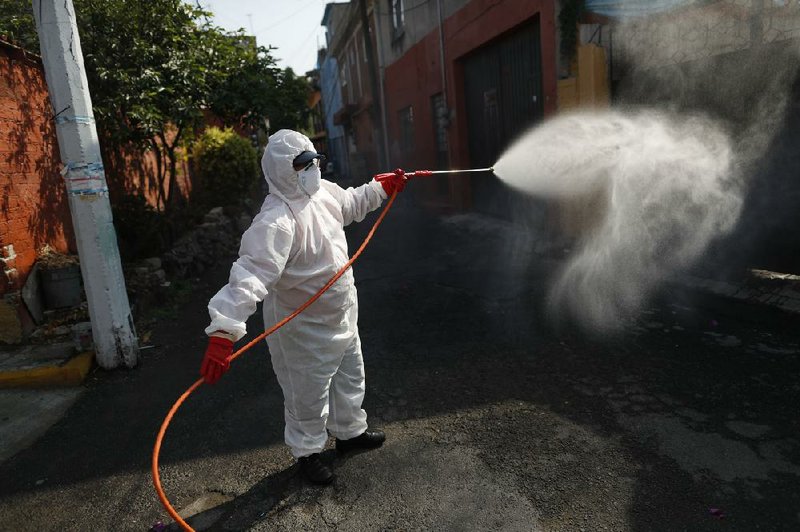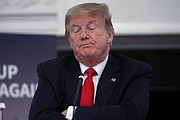WASHINGTON -- President Donald Trump announced Friday that he would withdraw funding from the World Health Organization, end Hong Kong's special trade status and suspend visas of Chinese graduate students suspected of conducting research on behalf of their government.
Trump has been critical of the WHO for weeks over what he says was an inadequate response to the initial outbreak of the coronavirus in China's Wuhan province late last year.
The president said in a White House announcement that Chinese officials "ignored" their reporting obligations to the WHO and pressured it to mislead the public about an outbreak that has now killed almost 103,000 people in the United States.
"We have detailed the reforms that it must make and engaged with them directly, but they have refused to act," the president said. "Because they have failed to make the requested and greatly needed reforms, we will be today terminating the relationship."
[CORONAVIRUS: Click here for our complete coverage » arkansasonline.com/coronavirus]
The U.S. is the largest source of financial support for the WHO and its exit is expected to significantly weaken the organization. Trump said the U.S. would be "redirecting" the money to "other worldwide and deserving urgent global public health needs," without providing specifics.
He noted that the U.S. contributes about $450 million to the world body while China provides about $40 million.
Critics of the administration's decision to cut funding called it misguided, saying it would undermine an important institution that is leading vaccine development efforts and drug trials to address the covid-19 outbreak.
"Severing ties with the World Health Organization serves no logical purpose and makes finding a way out of this public health crisis dramatically more challenging," said Dr. Patrice Harris, president of the American Medical Association.
[Video not showing up above? Click here to watch » https://www.youtube.com/watch?v=dhhf2TMuxZw]
Sen. Chris Murphy, D-Conn., called it a distraction that would "hand over" the organization to China. "Leaving castrates our ability to stop future pandemics and elevates China as the world's go-to power on global health," he said.
The WHO declined to comment on the announcement. Officials of the U.N. agency have not directly addressed a letter that Trump sent to the general director May 18, warning he would make permanent a temporary freeze on U.S. funding and reconsider U.S. membership unless it committed to "major substantive improvements within the next 30 days."
Sen. Lamar Alexander, R-Tenn., chairman of the Senate health committee, also warned that the president's decision could interfere with vaccine trials and international cooperation in future outbreaks.
"Certainly there needs to be a good, hard look at mistakes the World Health Organization might have made in connection with coronavirus, but the time to do that is after the crisis has been dealt with, not in the middle of it," said Alexander, echoing a point made by others, including the head of the United Nations.
At a later event Friday, Trump was asked about relations with China, and he repeated his suspicions about how the country managed to apparently contain the virus in Wuhan while it spread to Europe and the United States.
"Well, we're certainly not happy with what happened with respect to China," he told reporters.
HONG KONG BOILS OVER
Tensions over Hong Kong have been increasing over the past year as China has cracked down on protesters and sought to exert more control over the former British territory.
Trump said the administration would begin eliminating the "full range" of agreements that had given Hong Kong a relationship with the U.S. that mainland China lacked, including exemptions from controls on certain exports. He said the State Department would begin warning U.S. citizens of the threat of surveillance and arrest when visiting the city.
"China has replaced its promised formula of one country, two systems, with one country, one system," he said.
Secretary of State Mike Pompeo notified Congress on Wednesday that Hong Kong is no longer deserving of the preferential trade and commercial status it has enjoyed from the U.S. since it reverted to Chinese rule in 1997.
It's not yet clear what impact the decision will have on U.S. companies that operate in Hong Kong or on the city's position as Asia's major financial hub, or how China will react to the decision.
"The downward spiral in the bilateral relationship has now reached lows not seen since the June 4, 1989, Tiananmen massacre, and there is little reason to expect things to get better soon," said Dexter Tiff Roberts, an Asia expert at the Atlantic Council, which publishes nonpartisan policy analysis.
Rep. Chris Smith, R-N.J., who is a commissioner of the Congressional Executive Commission on China, praised the decision on Hong Kong as an overdue response to the government of Chinese President Xi Jinping for human rights abuses, including against religious minorities in the Xinjiang region.
"After years of human rights admonishment and cheap rhetoric devoid of any meaningful penalties, Xi has concluded that the West is all talk, no action," Smith said. "President Trump, however, is today beginning to change that and is doing what previous presidents have failed to do."
TENSIONS DERAIL STUDENTS
The president also said the U.S. would be suspending entry of Chinese graduate students who are suspected of taking part in an extensive government campaign to acquire trade knowledge and academic research for the country's military and industrial development.
Allowing their continued entry to the country would be "detrimental to the interests of the United States," Trump said in an order released after the White House announcement.
Revocation of the visas has faced opposition from U.S. universities and scientific organizations that depend on tuition paid by Chinese students to offset other costs and fear possible reciprocal action from Beijing that could limit their access to China.
The order issued by the president included an exemption for students whose work was not expected to benefit the Chinese military.
China seemed to signal in recent days that it was hoping to ease tensions. Premier Li Keqiang told reporters Thursday that both countries stood to gain from cooperation, and to lose from confrontation, because their economies have become so interconnected.
"We must use our wisdom to expand common interests and manage differences and disagreements," Li said.
Still, China has insisted that its control of Hong Kong is an internal matter, and it has disputed that it mishandled the response to the virus.
ECONOMIC NEWS BAD
Earlier Friday, U.S. Commerce Department statistics showed a record-shattering 13.6% drop in spending in April, a day after a federal jobs report showed another 2 million-plus Americans went out of work last week. The depth of the spending drop is particularly damaging because consumer spending is the primary driver of the economy.
The bad economic news was echoed in Europe, where an extensive social welfare net was showing signs of fraying, as protests erupted for a second day in Spain against layoffs by French carmaker Renault and Italy's chief central banker warned that "uncertainty is rife."
Some U.S. states were going ahead with steps to reopen businesses and leisure activities needed to spur spending and restore jobs, but there were also reminders of the risks of moving too quickly.
In Missouri, officials said they were trying to notify "mass numbers of unknown people" after someone who attended crowded pool parties Memorial Day weekend at the Lake of the Ozarks tested positive for covid-19. Video of the parties circulated widely online, with many people criticizing revelers for flouting social distancing guidelines.
New York City, meanwhile, was on track to begin reopening June 8 as the state gradually loosens restrictions, Gov. Andrew Cuomo said Friday.
The nation's worst pandemic hot spot was meeting goals set for hospital rates and testing, will "stockpile" personal protective equipment including masks and will focus on infection rates in outbreak areas by ZIP code, he said.
He made the remarks as a large swath of upstate New York got the go-ahead Friday to reopen hair salons, retail shops and offices under strict guidelines. New York City remains the only region of the state that hasn't started reopening.
According to the tally by Johns Hopkins University, cases in the U.S. now top 1.7 million.
JANUARY SPARK CITED
A federal public health study released Friday shed more light on the contagion's beginnings in the United States. The most comprehensive federal study to date concluded that the spark that started the U.S. coronavirus epidemic arrived during a three-week window from mid-January to early February, before the nation halted travel from China.
Some people have claimed Americans were getting sick from the coronavirus as early as November and that infections were spreading in the U.S. before any case was identified, said Dr. Robert Redfield, head of the U.S. Centers for Disease Control and Prevention. Redfield said the study "puts data into the discussion."
Elsewhere, New Zealand said it has all but eradicated the coronavirus with just one person in the nation of 5 million known to be infected. But developments were grim in other nations, with India reporting a record increase in cases, and Pakistan and Russia reporting record numbers of deaths.
In the first major increase since France started gradually reopening May 11, authorities reported more than 3,000 new daily infections. The agency clarified Friday that the surprising new figures were the result of a new accounting method, and not linked to a much-feared second wave of the virus.
Worldwide, the virus has infected about 5.9 million people and killed about 364,000, according to Johns Hopkins University.
Information for this article was contributed by Kevin Freking, Jamey Keaten, Martin Crutsinger, Dan Sewell, Holly Ramer and Angela Charlton of The Associated Press.
A Section on 05/30/2020

